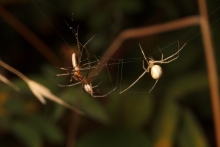
It’s no secret that the internet and social media fuel rampant spread of misinformation in many areas of life. A collective of researchers, including Catherine Scott, Postdoctoral Fellow in McGill University’s Lyman Lab, have explored this phenomenon as it applies to news about spiders. The verdict? Don’t blindly trust anything you read online about these eight-legged arthropods—or anything else for that matter—and always consider the source.

It’s no secret that the internet and social media fuel rampant spread of misinformation in many areas of life. A collective of researchers, including Catherine Scott, Postdoctoral Fellow in McGill University’s Lyman Lab, have explored this phenomenon as it applies to news about spiders. The verdict? Don’t blindly trust anything you read online about these eight-legged arthropods—or anything else for that matter—and always consider the source.

A sprawling study of spiders across northern Canada has turned up more than 100 species in provinces or territories where they had never before been recorded. The findings, by researchers from McGill University, provide a valuable new benchmark for monitoring biodiversity across Canada’s vast northern expanses.

Insecticides that are sprayed in orchards and fields across North America may be more toxic to spiders than scientists previously believed.

Even jumping spiders have personalities scientists have discovered. A "shy" individual will not make the same choices as a "bold" individual. This means that some individuals, because of their personality type, will capture more prey than others, and will therefore have a larger effect on local ecosystems.
